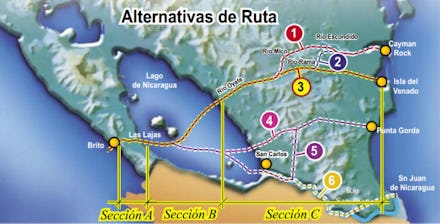China May Build Their Own "Panama Canal" in Central America

The news: Nearly 100 years after construction on the Panama Canal was completed, plans are in motion to build yet another waterway in Central America to connect the Atlantic Ocean to the Pacific.
In June, the Nicaraguan government struck a deal with Chinese businessman Wang Jing for construction of a Nicaragua Canal that comes with, at minimum, a $40 billion price tag. That's a lot of cash – but again, this involves literally cutting through an entire country to connect the two largest oceans on Earth. So yes, it's going to be expensive. But if actually completed, this could be one of the greatest engineering feats in recent history.
Source: The Telegraph
The backstory: Nicaragua has long held out hope for a canal of its own to rival Panama's. And now they're closer than ever to fulfilling that national dream, thanks to the pledge of Wang's HKND Group, which plans to begin construction at the end of 2014 and complete the project in five years.
The deal gives Nicaragua $10 million per year for 10 years once the canal is operational, with ownership incrementally transferring from Wang to the country over the course of 100 years. Along with tax and land concessions to build the canal, Nicaragua also gave Wang allowances to construct an oil pipeline, railway, and international airport.
Source: Interntaional Business Times
Why this matters: This has the potential to be a game changer for international trade. From the deal with Wang, Nicaragua's Sandinista government (for info on the Sandinistas, just ask Bill de Blasio) is setting up construction for a canal three times as long as its Panamanian counterpart, which itself is considered to be one of the seven wonders of the modern world. Why is the Panama Canal a wonder of the modern world? I'll say it one last time: it cuts a country in half and connects two oceans. So I'm thinking a Nicaragua Canal three times the length will be pretty damn impressive.
Some Nicaraguans are, understandably, getting pretty excited over this. For years, the country has seen a canal as a ticket to economic development (estimates by the government predict a canal could double Nicaragua's annual GDP). Now with this deal, its citizens are saying things like "bless the great trans-ocean canal" and "the canal will change the face of my country … God wants it to be so."
But not everyone is optimistic. Ed Sands, a global logistics official at the consulting firm Procurian called the canal plan a "borderline fantasy" because "there is simply no need, no demand for another canal in Central America." According to The Economist, "the economic case is not easy to make," because "world trade is sluggish" and "new routes may develop through the arctic," eliminating the need for another canal in Central America. Others are worried construction could damage and pollute Lake Nicaragua and the country's tropical forests. And, of course, there are those skeptical that the Sandinista government, led by Daniel Ortega, is simply out to make money for itself. So as promising as it may be, the project is wrought with concerns.
And the idea of a Chinese-controlled trans-oceanic canal can't be too reassuring to the United States. But let's not forget, the U.S. backed a rebellion to get its hands on construction of the Panama Canal, a project that lasted a decade.
A Nicaragua canal may very well be a dream too good to be true. But if completed, it could change the face of Central America and become a true marvel of the modern world.